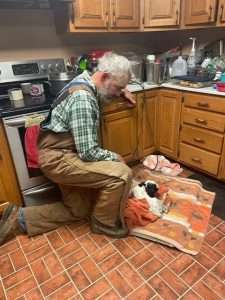Shelby Varner
Kansas Living
Magazine
“You’ve got to be kidding me!” That was my initial reaction when I saw the predicted forecast for winter break. As a college student at Kansas State University, I love going home and seeing my family and animals, but when temperatures are expected to be below zero plus windchill, my joy in going home decreases. My sisters and I raise goats and when the weather gets cold, we go into what I call, “survival mode.”
Caring for goats throught the night
While K-State calls it winter break, it isn’t much of a break when I go home. The Wednesday before break, my sister called and said we had started kidding (birthing) season. When one goat kids it usually starts a chain reaction of babies. That meant my family was about to have babies being born in cold, windy weather. The combination of wet babies and wind can quickly become deadly. While we have sheds to help block the wind, and the body heat from the goats keep babies warmer, it does not mean the mother goats will have their babies in them. This meant my family and I were checking goats at least every two hours, even through the night. I would take the midnight and 6 a.m. shifts while my middle sister, Tara, got up at 2 a.m. and my oldest sister, Amy, got up at 4 a.m. We were all cold and tired, but we knew if we didn’t check the goats in these extreme conditions that they’d suffer. Being caretakers of animals is a full-time job, even through 35 below zero wind chills and 2 a.m. alarms.
Kidding goats through the harsh conditions of winter
Nine goats decided they would continue to have babies the frigid days before Christmas, which filled up our kidding pens very quickly. Our kidding pens are small enclosures in our shed where we can closely monitor the mom and babies to make sure the mom and baby recognize each other, and the baby will drink from the mom and the mom will let it before putting them with other goat families. It also allows us to check the babies and be confident they are getting enough milk.
One issue we ran into this time was moms producing enough milk for their babies, which is a rare problem for us. Usually when a mom has babies, she produces plenty of milk. We think because of the cold, the goats lowered their water consumption and couldn’t produce milk right at birth for their babies. This added extra stress because we bottle fed babies extra milk to get them going while enticing the mothers to drink and start producing more milk. Also, if the babies got too cold, we would take them into my dad’s shop to warm them up. Thankfully, usually after a day the mom would start keeping up with their baby’s milk needs which helped keep the baby warm.
The hard part of raising goats
During this cold snap, we didn’t lose any meat goats, but we did lose a couple of dairy goat babies. My family had just fed babies milk and we were back in the house and ready to watch our first Christmas movie together. Amy wasn’t back in the house, but that isn’t uncommon because she gets easily distracted by the goats, so I texted her the movie was about to begin. A few moments later the door burst open, and she said, “Shelby,” in a tone that put Tara and I on our feet in a heartbeat.
A first-time Nigerian dwarf mom decided to have her babies in an area of the pen with little wind block. She also didn’t naturally come by mothering skills because the babies didn’t seem to be cleaned up at all. Amy brought two babies in, and we rubbed them while trying to warm them up. We were only able to save one by putting him under warm water. We then put him on a heating pad and rubbed a towel on his legs while using a hairdryer to warm him up even more. While Tara and I worked on this baby, Amy went back outside and found two more that had passed.
The King of the house
I was able to get warm milk in the survivor’s tummy and kept him on the heating pad in the kitchen for the night. It’s not uncommon to see goats in my family’s house so when I put him on the heating pad with nothing around him at bedtime, no one was shocked. When I went to bed that night, I just hoped I would see him in the morning. When I got up at midnight he was still snuggled on his pad and looked the same that morning. Now he is a growing boy named King.
As we got past the cold and were no longer hauling water buckets everywhere, the goats continued to kid and only one person got up in the middle of the night. While the goats are under the herd name of 3 Varner Girls, there are so many more people who help make everything function. My dad is almost always on call for kidding problems and will probably always be able to outwork all of us, combined. My mom made sure we had warm food to eat and we didn’t destroy the house. There is also my boyfriend Jared who helps us care for the goats, even on the frigid days. While I don’t love putting on layers of clothes just to have my toes feel like they are still freezing, I love being able to spend time with the people I love and being responsible, nurturing caretakers of these animals.



